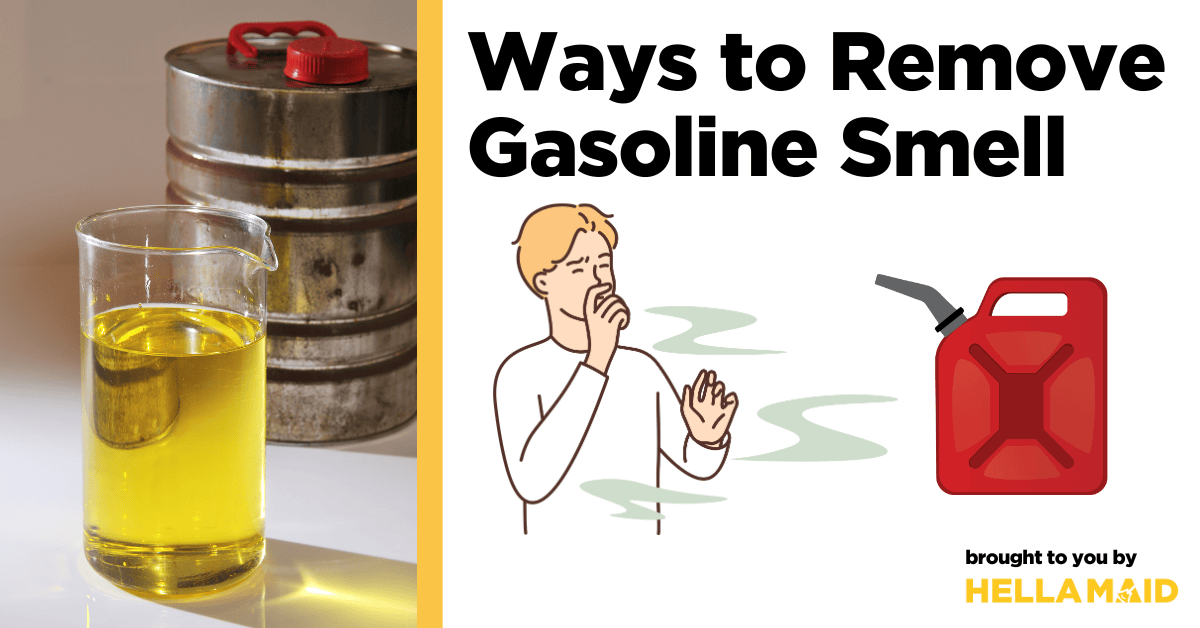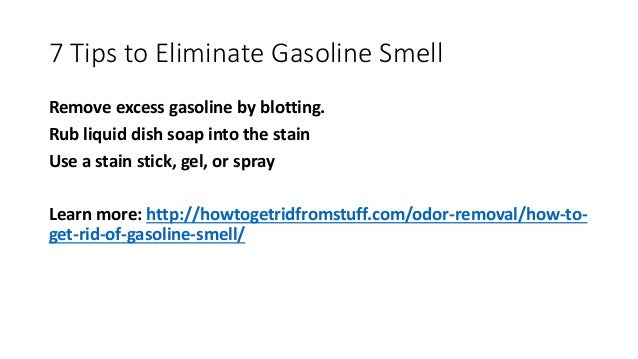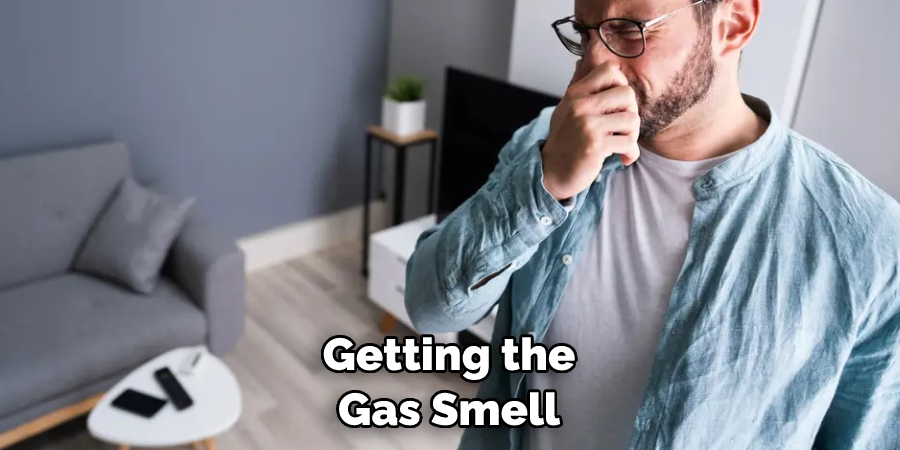How To Get Rid Of Gasoline Odor In House

One common heating and cooling problem that many homeowners encounter is a strange odor emanating from their HVAC system. While sometimes it's a simple, harmless smell, other times it can be indicative of a more serious issue. One particularly alarming odor is that of gasoline. The smell of gasoline in your house is not only unpleasant but potentially dangerous, as gasoline fumes are flammable and can cause health problems. This article will guide you through the steps to safely identify the source of the gasoline odor and take appropriate action.
Diagnosing the Gasoline Odor
Before you panic, it's crucial to determine the strength and location of the gasoline smell. This will help you pinpoint the potential source and decide on the best course of action. A methodical approach is key.
Step 1: Initial Assessment (No Tools Required)
Begin by taking a deep breath (cautiously!) and trying to assess the intensity of the smell. Is it faint, strong, or overpowering? A faint odor might indicate a small spill or leak that has mostly dissipated. A strong, lingering odor suggests a larger, more recent issue.
Next, try to determine the location where the smell is strongest. Walk around your house, paying attention to areas near your HVAC system, garage, basement, and any place where gasoline might be stored or used. Note the rooms or areas where the odor is most prevalent. This will significantly narrow down your search.
Avoid using open flames or creating sparks during this process. Gasoline fumes are highly flammable, and any ignition source could be extremely dangerous. Also, ventilate the area as much as possible by opening windows and doors.
Step 2: Inspecting Potential Sources (Visual Inspection)
Now, let's examine potential sources, starting with the most likely culprits:
- Gasoline Storage: Check all containers where gasoline is stored, such as gas cans for lawnmowers or other equipment. Ensure the lids are tightly sealed and that there are no signs of leaks or spills. Look for damp spots or puddles around the base of the containers. If you find any spills, clean them up immediately with absorbent materials like paper towels or kitty litter. Dispose of the contaminated materials properly.
- Lawn and Garden Equipment: Examine your lawnmowers, weed whackers, generators, and other gasoline-powered equipment. Check for fuel leaks around the carburetor, fuel lines, and fuel tank. If you find any leaks, do not attempt to start the equipment. Consider taking it to a qualified repair technician.
- Vehicles: If you park your car or other vehicles in a garage attached to your house, check for fuel leaks. Look under the car for puddles or damp spots. Inspect the fuel lines and gas tank for any signs of damage or corrosion. If you suspect a leak, do not drive the vehicle until it has been inspected and repaired by a mechanic.
- HVAC System (Visual Check): While it's less common, sometimes gasoline-like odors can be related to your HVAC system, particularly if you have an oil-burning furnace. Visually inspect the area around your furnace for any signs of leaks or spills. Look for dark stains on the floor or walls. If you detect any fuel oil leaks, do not attempt to repair the system yourself. Contact a qualified HVAC technician immediately.
- Recent Spills: Think back to any recent activities that might have involved gasoline. Did you fill up a lawnmower, use a generator, or transfer gasoline from one container to another? Even small spills can create a lingering odor.
Step 3: Advanced Inspection (Basic Equipment May Be Required - Use Caution!)
If the initial visual inspection doesn't reveal the source of the odor, you may need to do a more thorough investigation. This may involve using a flashlight and, in some cases, a simple leak detector (available at most hardware stores).
- Fuel Lines and Connections: Carefully inspect all fuel lines and connections for signs of leaks. Use a flashlight to get a better view of hard-to-reach areas. If you suspect a leak but can't see it, you can try using a spray bottle filled with soapy water. Spray the soapy water onto the fuel lines and connections. If there's a leak, you'll see bubbles forming. Note: Only do this if you are absolutely comfortable working around gasoline and know how to safely disconnect and reconnect fuel lines. If not, call a professional!
- Basement Sumps and Drains: Check your basement sump pump and floor drains. Sometimes, gasoline can seep into the ground and contaminate groundwater, which can then enter your house through these entry points. If you suspect contamination, contact your local environmental protection agency.
- HVAC System (Advanced - Proceed with Extreme Caution!): If you have an oil-burning furnace and suspect a leak, do not attempt to disassemble or repair any part of the system yourself. However, you can carefully sniff around the furnace's fuel filter and fuel pump. If you detect a strong gasoline or oil odor, call a qualified HVAC technician immediately. Tampering with the fuel system of an oil furnace is extremely dangerous and can lead to a fire or explosion.
DIY Actions to Eliminate the Gasoline Odor (Once the Source is Identified and Resolved)
Once you've identified and resolved the source of the gasoline odor (e.g., cleaned up a spill, repaired a leak, or removed contaminated materials), you can take steps to eliminate the lingering smell.
Ventilation: The Most Important Step
The most effective way to get rid of gasoline odor is to ventilate the affected area thoroughly. Open all windows and doors to allow fresh air to circulate. Use fans to circulate the air and help dissipate the fumes. If the odor is particularly strong, consider using an exhaust fan to draw the fumes out of the house.
Absorbents:
If you had a spill, even after cleaning, residue may remain. Use absorbent materials like baking soda, kitty litter, or activated charcoal to absorb any remaining fumes. Sprinkle the absorbent material over the affected area and let it sit for several hours or overnight. Then, vacuum up the absorbent material. Dispose of the used absorbent material properly.
Cleaning:
Clean all surfaces that may have come into contact with gasoline. Use a solution of mild detergent and water. Wipe down floors, walls, and furniture. Rinse thoroughly with clean water. For porous surfaces like carpets or upholstery, you may need to use a specialized cleaning product designed to remove gasoline odors. Test the product in an inconspicuous area first to ensure it doesn't damage the material.
Air Fresheners:
After ventilating and cleaning, you can use air fresheners to help mask any remaining odors. However, don't rely on air fresheners alone to eliminate the gasoline smell. They will only mask the odor, not remove it.
Ozone Generators:
Ozone generators should be used with extreme caution and only as a last resort. Ozone is a powerful oxidant that can break down odor molecules, but it can also be harmful to your health. Never use an ozone generator while people or pets are present in the area. Follow the manufacturer's instructions carefully and ventilate the area thoroughly after using an ozone generator.
Professional Cleaning Services:
If the gasoline odor is persistent and you've tried all the DIY methods without success, consider hiring a professional cleaning service that specializes in odor removal. They have specialized equipment and cleaning products that can effectively eliminate even the most stubborn odors.
When to Call a Professional HVAC Technician or Emergency Services
While some gasoline odor issues can be resolved with DIY methods, there are situations where it's crucial to call a professional HVAC technician or even emergency services.
- Strong, Persistent Odor: If the gasoline odor is strong and persistent, even after ventilation and cleaning, it could indicate a significant leak or a more serious problem with your HVAC system.
- Suspected Fuel Oil Leak: If you suspect a fuel oil leak from your oil-burning furnace, do not attempt to repair the system yourself. Contact a qualified HVAC technician immediately. Fuel oil leaks can be dangerous and can lead to a fire or explosion.
- Health Symptoms: If you experience any health symptoms, such as dizziness, headache, nausea, or difficulty breathing, evacuate the house immediately and call emergency services (911).
- Uncertainty: If you're unsure about the source of the gasoline odor or how to safely resolve the problem, it's always best to err on the side of caution and call a professional.
Safety Precautions
Safety is paramount when dealing with gasoline odors. Gasoline fumes are highly flammable and can be harmful to your health. Follow these safety precautions:
- No Open Flames or Sparks: Do not use open flames or create sparks in the affected area. This includes smoking, lighting candles, or using electrical equipment that could generate a spark.
- Ventilation: Ventilate the area thoroughly by opening windows and doors.
- Avoid Inhaling Fumes: Avoid inhaling gasoline fumes as much as possible. Wear a respirator or face mask if necessary.
- Proper Disposal: Dispose of contaminated materials, such as rags, paper towels, and absorbent materials, properly. Do not put them in the regular trash. Contact your local waste management company for guidance on proper disposal methods.
- Evacuate if Necessary: If the gasoline odor is strong and you experience any health symptoms, evacuate the house immediately and call emergency services (911).
By following these steps, you can safely identify and eliminate gasoline odors in your house and protect your health and safety.










